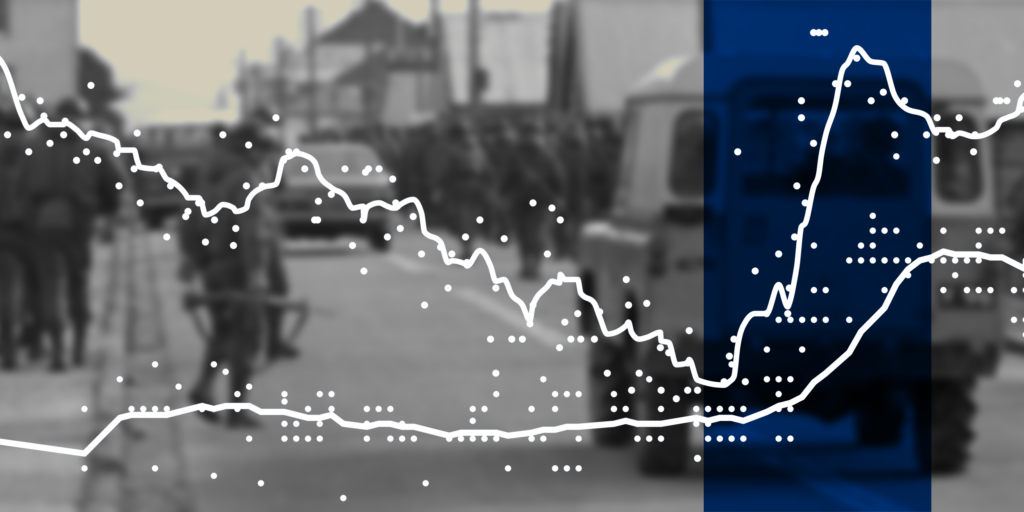Radish to romanesco: A year in vegetables
February 20th, 2025
4 min
This article is brought to you by Datawrapper, a data visualization tool for creating charts, maps, and tables. Learn more.

Hi, this is Lisa. You might know me from a blog post or two I wrote for the Datawrapper blog. Today, let’s make a connection between the upcoming French election and how Margaret Thatcher got elected as U.K. prime minister in 1983.
The chart below shows polling results for what commentator Pierre Haski called “the most unexciting presidential election in living memory” in this BBC article: the French presidential election. Its first round will happen in less than three weeks, on April 10, 2022. (The second round, in which only the top two finishers of the first round compete, will happen on April 24.)
Why did his numbers go up that much? The annotation in the chart already tells you it's clearly correlated to the Russia-Ukraine war. As French political analyst Thomas Guénolé told The Guardian, Macron is "a wartime president" now. He's on the phone with Biden, Xi Jinping, Putin. According to pollster Emmanuel Rivière, "The French are very sensitive to the question of whether they still count in the world — and Macron makes them feel they do." In addition, people know what they get with Macron, while so much else seems uncertain. "Voters are seeking some form of stability at a time of fear, and Mr Macron is often at his best in a crisis," The Economist writes.
As you can see, the current president's chances for reelection are very, very good. On Monday, the Economist's election forecast gave Macron a 98:2 chance to win the presidency.
"In France, they are calling it the effet Malouines or 'Falklands effect'," as The Guardian explains. ("Îles Malouines" is the French name for the Falkland Islands.) "Just as the conflict in the South Atlantic waged by Margaret Thatcher in 1982 led to her dramatic recovery in the polls and subsequent re-election, Macron’s popularity has soared, polls suggest, thanks to his high-profile engagement as Europe’s go-between in Russia’s war on Ukraine."
Let's have a closer look at what exactly happened to the U.K. polls around the time of the Falklands War:
The Labour party polled better than the Conservative party for most of the time between the 1979 election and 1982. The war changed that, creating a comfortable 18 percentage point lead for the Conservatives. If it weren't for the Falklands War, maybe Thatcher wouldn't have been reelected one year later.
In present-day France, the situation is different. Macron didn't need the Ukraine-Russia war; he already was in the lead in the past months "thanks to a mediocre opposition, goodish economic news and the decline of Covid," as the BBC writes.
Also: Things could still change. Far-right, anti-immigrant candidate Marine Le Pen, Macron's biggest competition, also saw the highest poll results since last year in recent weeks. And Macron doesn't see the need to participate in campaigning or debates, which provokes criticism. “Rivals have warned that Mr. Macron would not enjoy a strong mandate if he were to be re-elected without fully engaging in the race,” the New York Times writes. Guénolé again: “We have seen this in previous elections when a candidate won almost by default. If Macron wins under these conditions, it will not be five years of democratic government, but five years of disastrous political tension.” Maybe it's not a bad thing that Macron's high poll numbers didn't last long — they're on a downward trend already.
Do leaders in other countries see the Falklands effect too? Short answer: Not as much. U.S. president Joe Biden's approval rating has been relatively steady since February 24. In the U.K., prime minister Boris Johnson is seeing his highest approval ratings (30%) since last October, but on March 10, they were only 5 percentage points up from February 10. The party of the Polish president Andrzej Duda, "Law and Justice," has also experienced a slight upwards slope in polls.
Some of the biggest — but still relatively small — improvements can be seen in Germany. When asked if German chancellor Olaf Scholz is "fairly good" or "fairly bad" at his job, 73% of polled Germans said "fairly good" on March 11 — up 17 percentage points from February 11, and the highest number this year. The party of Olaf Scholz, the SPD, isn't seeing higher polling numbers. That's different from the German Green Party, whose polls in the past two weeks (19%) have been better than any since the federal election last September. The Greens talk a lot about alternative energy sources, which benefits them now that Germans want to be more independent from Russian gas.
In other countries, it might be too early to tell. Politico's "Poll of polls" makes clear that daily or even weekly poll numbers are not the norm for most European countries. Time will tell if they see a "Falklands effect" too — and for how long Macron will ride his.
Thanks for reading this Weekly Chart! To keep informed about French polls, I recommend these sites by The Economist, Reuters, and The Guardian. For French sources, visit Le Monde or Le Figaro. You will also find a daily-updating polling chart in our River. We'll see you next week!
Comments